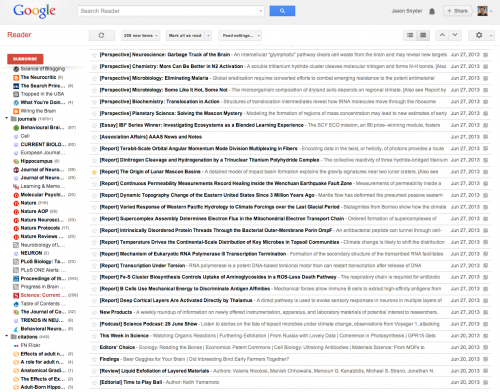I’ve thought of writing about RSS feeds for scientists for a couple of years now so it’s kind of funny that I’ve only gotten around to it 3 days before Google shuts down Reader. And it must be important to me because this is my first post in 6 months (except for a post on new neuron connectivity over at Brainfacts.org). In the last year or so I’ve heard a number of people say that RSS is dead and, frankly, I have no idea what they’re talking about. I suppose social media has grown enormously during this time and has become a valuable way to discover new information but I still find that many new papers go unnoticed if I don’t systematically scan that table of contents of all my favorite journals. And this is what RSS does best. The fact that many scientists don’t use RSS feeds, or have never heard of them, is the inspiration for this post. So I would argue that RSS may not be dead but, rather, has not fully come to life.
 RSS is Really Simple Syndication. It’s a way to subscribe to your favorite websites so that their new content shows up in your RSS reader. Subscribing is usually as easy as clicking on one of these things:
RSS is Really Simple Syndication. It’s a way to subscribe to your favorite websites so that their new content shows up in your RSS reader. Subscribing is usually as easy as clicking on one of these things: ![]() or copying and pasting a url. Email for the internet, some have said. Instead of having to revisit dozens of websites that update with varying regularity one can simply open their RSS reader, see the sites that have updated content, and read the new content directly in the RSS reader (or at least the title or abstract¹). If you don’t have time to read a full article you can flag items for later viewing². I subscribe to 25 journals and about 50 blogs. I also subscribe to Google Alerts and Pubmed searches, feeds that track citations to my articles, and feeds that tell me when someone comments on a Flickr photo or edits a Google spreadsheet. It’s the only way I know to stay on top of everything, be all knowing, etc³. And I’ve backed up my Google Reader data so that when it closes on July 1 I can spend Canada Day not with my family but instead testing out a bunch of alternative RSS readers. Or at least testing out a bunch of RSS readers on my phone, in close proximity to my family⁴.
or copying and pasting a url. Email for the internet, some have said. Instead of having to revisit dozens of websites that update with varying regularity one can simply open their RSS reader, see the sites that have updated content, and read the new content directly in the RSS reader (or at least the title or abstract¹). If you don’t have time to read a full article you can flag items for later viewing². I subscribe to 25 journals and about 50 blogs. I also subscribe to Google Alerts and Pubmed searches, feeds that track citations to my articles, and feeds that tell me when someone comments on a Flickr photo or edits a Google spreadsheet. It’s the only way I know to stay on top of everything, be all knowing, etc³. And I’ve backed up my Google Reader data so that when it closes on July 1 I can spend Canada Day not with my family but instead testing out a bunch of alternative RSS readers. Or at least testing out a bunch of RSS readers on my phone, in close proximity to my family⁴.
———————————————————————
¹some journals only allow you to see the title in the RSS reader, forcing you to click through to their website to see the abstract. Sometimes I refuse to click and say (in my head) “I hate you”.
²for example you can see in the image that I flagged an article on Lunar Mascon Basins, because I’m really into them.
³On the other hand, I simply cannot actually read everything I come across. So another approach is to use something like Google Scholar’s “My Updates” feature as it selectively notifies you of papers that are similar to your own. Given the number of grey haired academics with Google Scholar profiles, the effectiveness of Scholar’s citation data, and the fact that it’s Google I’ve often wondered why they don’t extend its functionality just a bit, so you can follow other scientists and their papers etc.
⁴So that when my son sees a float at the parade and says “Look daddy!” I can glance up and feign excitement for a moment and go back to my phone when he’s distracted again⁵.
⁵I’m so kidding⁶.
⁶Okay, 80% kidding.
I heartily recommend Feedly, especially if you use a complement of technology (iPad, iPhone, etc) to read your news items.